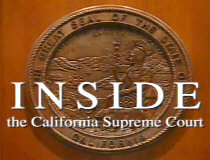California court expands immunity for bloggers
2 hours, 41 minutes ago
SAN FRANCISCO (Reuters) - Individuals who use the Internet to distribute information from another source may not be held to account if the material is considered defamatory, the California Supreme Court ruled on Monday in a reversal of a lower court decision.
The ruling supports federal law that clears individuals of liability if they transmit, but are not the source of, defamatory information. It expands protections the law gives to Internet service providers to include bloggers and activist Web sites.
"We acknowledge that recognizing broad immunity for defamatory republication on the Internet has some troubling consequences," California's high court justices said in their opinion.
SAN FRANCISCO (Reuters) - Individuals who use the Internet to distribute information from another source may not be held to account if the material is considered defamatory, the California Supreme Court ruled on Monday in a reversal of a lower court decision.
The ruling supports federal law that clears individuals of liability if they transmit, but are not the source of, defamatory information. It expands protections the law gives to Internet service providers to include bloggers and activist Web sites.
"We acknowledge that recognizing broad immunity for defamatory republication on the Internet has some troubling consequences," California's high court justices said in their opinion.
"Until Congress chooses to revise the settled law in this area, however, plaintiffs who contend they were defamed in an Internet posting may only seek recovery from the original source of the statement," the decision stated.
The opinion, written by Associate Justice Carol Corrigan, addressed a lawsuit by two doctors who claimed defendant Ilena Rosenthal and others distributed e-mails and Internet postings that republished statements the doctors said impugned their character and competence.
Rosenthal operates a San Diego-based Web site known as the Humantics Foundation (http://www.humanticsfoundation.com), which is critical of silicone breast implants.
Rosenthal had countered that her statements were protected speech and immune under the Communications Decency Act of 1996. It holds that: "No provider or user of an interactive computer service shall be treated as the publisher or speaker of any information provided by another information content provider."
Rosenthal operates a San Diego-based Web site known as the Humantics Foundation (http://www.humanticsfoundation.com), which is critical of silicone breast implants.
Rosenthal had countered that her statements were protected speech and immune under the Communications Decency Act of 1996. It holds that: "No provider or user of an interactive computer service shall be treated as the publisher or speaker of any information provided by another information content provider."
A California appeals court had ruled that Internet service providers and users could be held liable if they republish a statement if it is known to be defamatory.
California's high court took that decision up for review because the lawsuit against Rosenthal involved an individual instead of a service provider, and opted for a broad view of immunity under the Communications Decency Act.
California's high court took that decision up for review because the lawsuit against Rosenthal involved an individual instead of a service provider, and opted for a broad view of immunity under the Communications Decency Act.
"Requiring providers, users, and courts to account for the nuances of common law defamation, and all the various ways they might play out in the Internet environment, is a Herculean assignment that we are reluctant to impose," the court's justices held in their opinion.
"By declaring that no 'user' may be treated as a 'publisher' of third party content, Congress has comprehensively immunized republication by individual Internet users," they added.
Mark Goldowitz, the defense counsel who represented Rosenthal, said in a statement that the ruling offers protection against those who would chill free speech on the Internet.
"By declaring that no 'user' may be treated as a 'publisher' of third party content, Congress has comprehensively immunized republication by individual Internet users," they added.
Mark Goldowitz, the defense counsel who represented Rosenthal, said in a statement that the ruling offers protection against those who would chill free speech on the Internet.
"The soapbox is not liable for what the speaker has said," said Kurt Opsahl, a staff attorney with the Electronic Frontier Foundation who filed a brief arguing free speech protections should cover individuals, not just Internet service providers.
(Additional reporting by Eric Auchard in San Francisco)
(Additional reporting by Eric Auchard in San Francisco)





